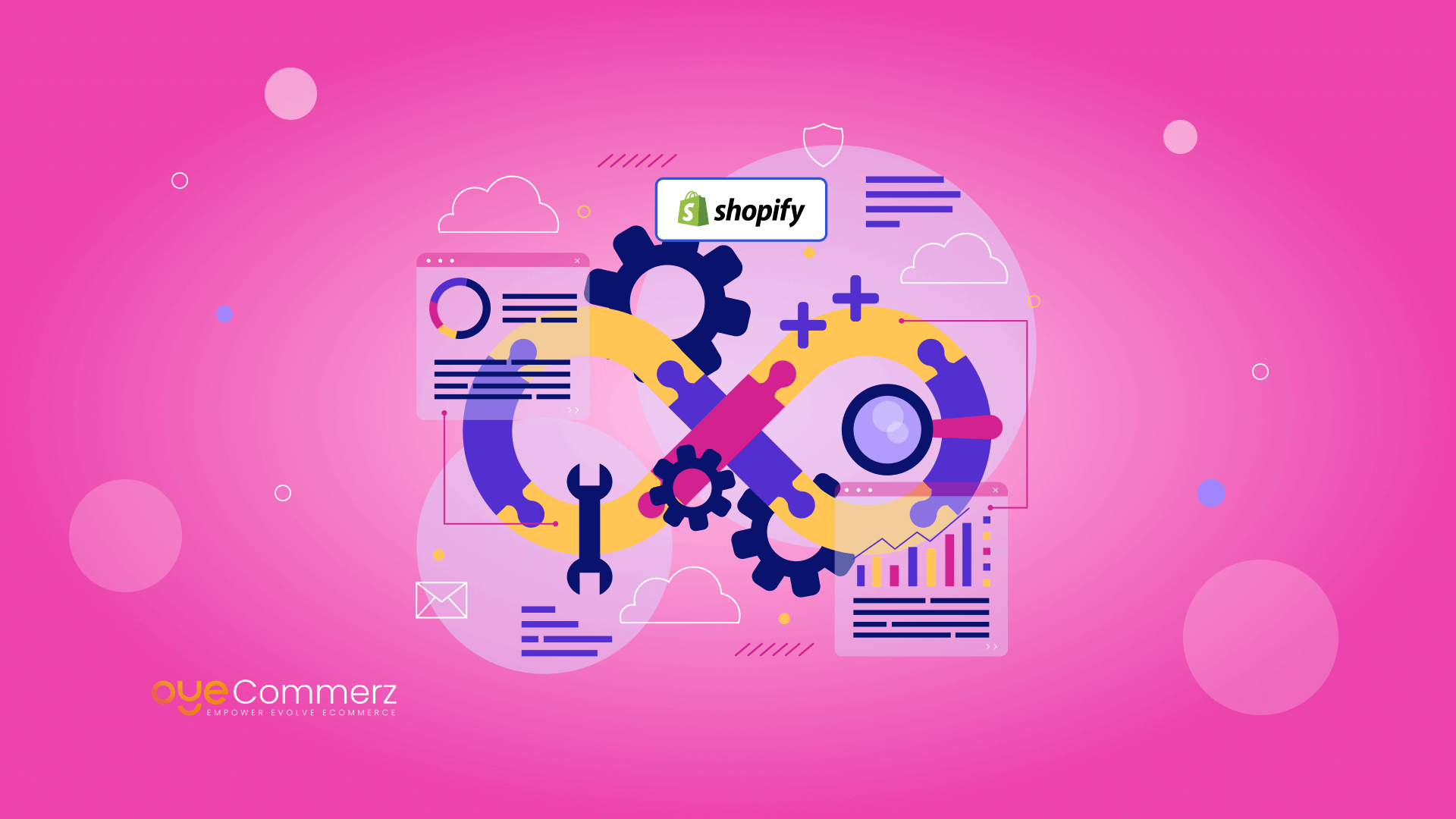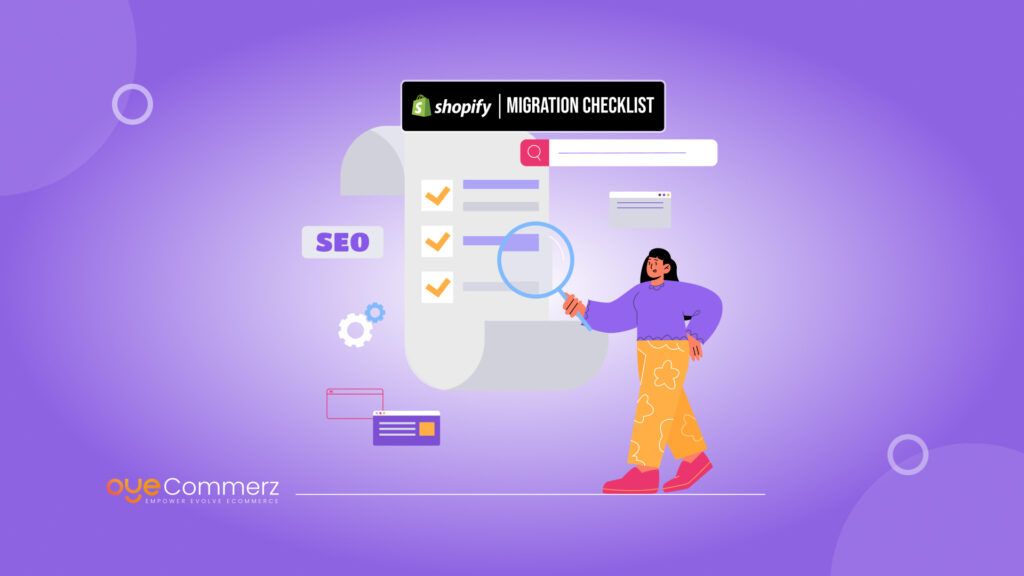Shopify is one of the most valuable tools for companies focused on the e-commerce marketplace in the modern tools-driven economy. Therefore it can suit the needs of an entrepreneur, a small business person, or even a large company. But, merely having an e-commerce store on the Shopify platform cannot be taken as a sign of success. Due to strong competition and huge competition among different organizations, everyone is required to be involved in all aspects of e-commerce. But the Shopify integration tools fill this gap this is where integration tools come into play.
Table of Contents
ToggleThe right tools are capable of enhancing efficiency and organizational effectiveness resulting in higher sales. However, with hundreds of integration tools available, it becomes quite challenging to find which integration tools fit your business well. In this blog, we are going to discuss, why integration tools are imperative, how to select the best Shopify integration tools, and the five best tools that can assist your Shopify store to succeed in this highly competitive market.
Importance of Integration Tools
This shows that the various activities in an e-commerce business depend on how well the different functions such as marketing, inventory, order fulfilment, customer support, and financial recording/monitoring are being handled. The revenue in the e-commerce market in the United States was forecast to continuously increase between 2024 and 2029 by in total of 657.8 billion U.S. dollars (+53.79 percent). After the tenth consecutive increasing year, the indicator is estimated to reach 1.9 trillion U.S. dollars and therefore a new peak in 2029.
To many store owners, the management of these activities by conventional methods is neither time-effective nor feasible. Integrations into Shopify enable key workflows to be conducted automatically as well as different applications to be connected and these are critical to the successful operation of any organization.
Efficiency and Automation: Integration tools cut out the requirement for human intervention where repeated jobs such as updating a stock, an order confirmation, or a query from the customers are involved. This also helps cut costs since it will require fewer employees to do these tasks, it also reduces the chances of mistakes and it relieves some congestion in such areas that need more attention like the research and development or the market segment.
Enhanced Customer Experience: The physical appearance of stores is very important to consumers especially when making the final purchase, hence to avoid loss of customers shopping experience must be seamless. Integration tools are put in place to make sure that certain functions such as payments, delivery, and customer relations are seamless and productive, thus making the shopping experience for the customer a joyful one.
Data-Driven Decision Making: With the help of embedding tools to use with Shopify, business owners can gain detailed information on their customers, sales, and tendencies on the market. Such information can be used to inform the marketing approach, the products to be launched, and the way customers are to be dealt with.
How to Choose the Right Tools for Your Store
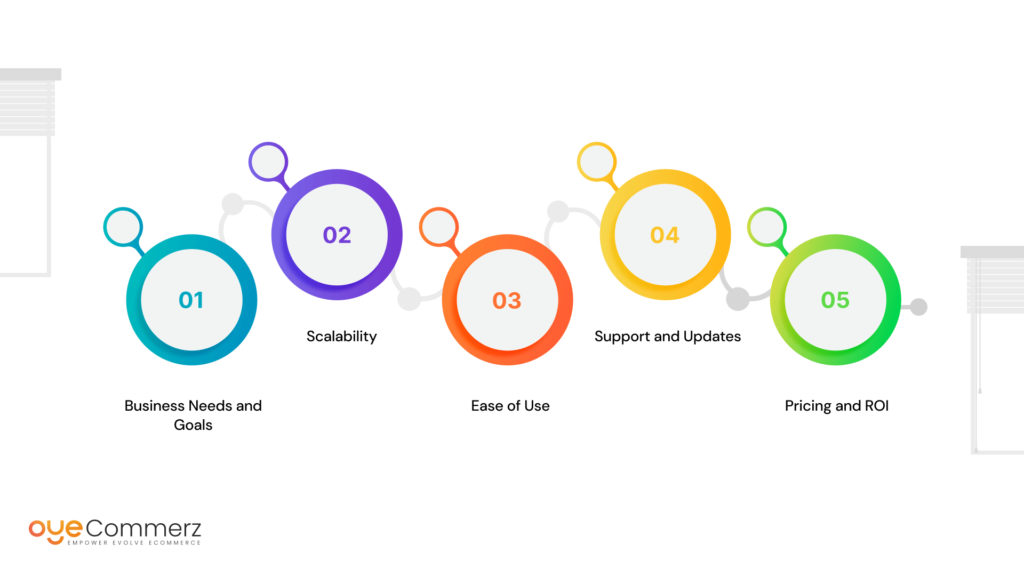
Selecting the right Shopify integration tools is one of the most important decisions you are going to make for your company since integration affects each aspect of your business. Here are the key factors to consider when selecting tools for your Shopify store:
Business Needs and Goals
Not all the stores built on Shopify are the same, and thus require different specifications. An apparel store may have more importance to inventory management as a feature, but a subscription service may consider customer retention tools more important. Primarily, determine what your business needs to achieve the particular objectives through the following additional points: Marketing automation is a complicated process; do you require help? Do you have issues in meeting consumers’ orders? Here, it is recommended that only your specific concerns be the main drivers of your decision.
Scalability
In your business, you get to accumulate more needs for business expansion. Ensure that the tools that you use are capable of expanding with the growth of your operation to accommodate more customer traffic and bigger databases of products. Many tools may be appropriate for small businesses while others are suitable for large enterprise businesses.
Ease of Use
Integration tools should, therefore, make work easier and not complicate matters. Think of how well a tool can be integrated into your current operations. Such a setup modifies them in ways that may eliminate the gains from automating the procedure in the first place. It is always good to settle for tools with user-friendly interfaces, as well as ease in interconnectivity with the Shopify store.
Support and Updates
Make sure that the tools are very reliable in terms of their customer services and support and are updated to be compatible with Shopify and other third-party applications. Lack of tools or poor support can result to fold ups as you seek to continue with the operations.
Pricing and ROI
However, using integration tools is not cheap and the cost can be quite prohibitive especially if one is in the habit of using several of them at the same time. Of course, you might want to opt for the lowest price, but that’s the case when you should estimate whether it will be repaid with interest. In the same way, a tool that increases sales or saves a lot of time could be better justified at a higher cost.
Top 5 Shopify Integration Tools
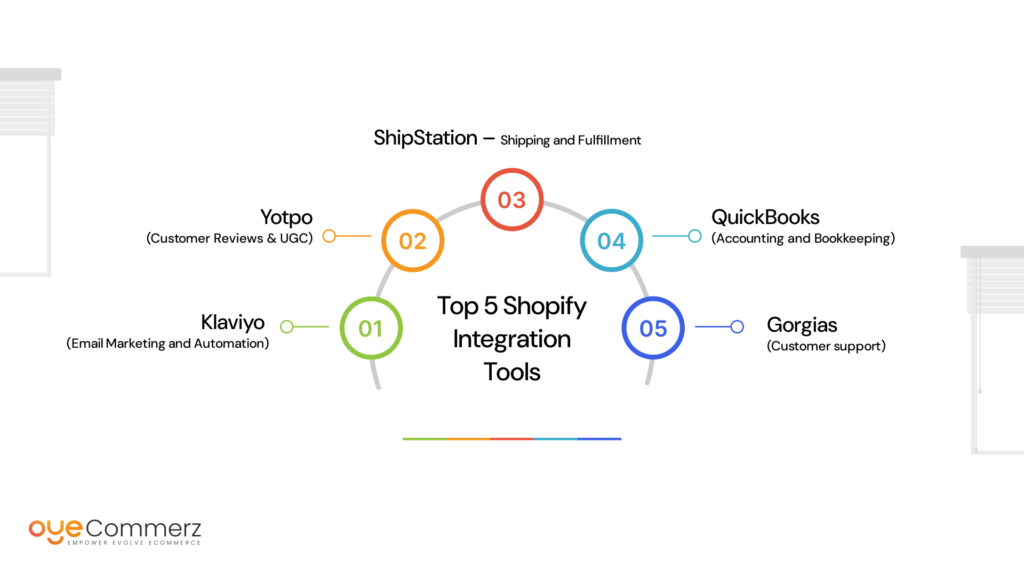
Here’s a curated list of the top five Shopify integration tools every store owner should consider:
Klaviyo (Email Marketing and Automation)
Klaviyo is a strategic solution for Shopify stores that wish to level up their email marketing game. This lets you create some of the most individualized, and information-driven email messages, helping to segment by behavior, purchase history, and everything in between. This makes sure that all the customers’ data is synchronized with Klaviyo and enables the creation of flawless automated email sequences that make people buy things. With Klaviyo, you can personalize your messages, targeting either abandoned carts, or delivering other recommendations to the customers.
Why You Need It: Even now, e-mail is among the highest ROI marketing mediums, and using Klaviyo, it’s effortless to take advantage of this. It is for growing businesses that need to expand the customer base for their products and services.
Yotpo (Customer Reviews & UGC)
Reviews and photos that customers share on a business’s page can be excellent tools that drive trust. Yotpo also works in synergy with Shopify; thus, you can gather and display customer feedback and ratings on your product blogs. It also has other high-level aspects that allow you to conduct loyalty programs that reflect rewards from satisfied customers. In addition to the reviews, Yotpo has a platform where you get customer insights, and that’s something I like about it.
Why You Need It: Yotpo, in an e-commerce environment in which many customers tend to rely on social proof, assists in persuading such customers to trust the seller. These two are very good indicators in ensuring that good reviews and user-generated testimonials increase conversion rates tremendously.
ShipStation – Shipping and Fulfillment
Shipping is one of the most sensitive aspects of Shopify that people face especially for a large number of orders and International shipping. This is by ensuring that ShipStation works with Shopify to ease the flow of the fulfillment process since it can generate labels, compare the shipping rates, and track the same. It can also help track and manage orders which are quite common through different service providers such as FedEx, UPS, and USPS.
Why You Need It: The problems arising from inefficient shipping processes can greatly affect a business organization by causing delays, dissatisfied customers, and high costs. This helps in the process of fulfilling orders while at the same time minimizing mistakes and the most crucial aspect of shipping expenses.
QuickBooks (Accounting and Bookkeeping)
It is essential for any business to keep track of its finances and QuickBooks’ application provides for easy management of the accounting needs of the business in Shopify. It helps to save time to export the Shopify sales data to QuickBooks by automatically doing it thus reducing the chances of errors when doing the books manually. The features of QuickBooks include profit and loss control, tax calculations, and inventory among others which ease financial reporting.
Why You Need It: Profit and loss computation is crucial in any organization, and QuickBooks guarantees the consumer a precise, real-time figuring out of the store’s wellbeing.
Gorgias(Customer support)
The more traffic you get for your e-commerce business, the more challenging it becomes to manage customer support. Gorgias is a helpdesk specifically for e-commerce stores and the application integrates well with Shopify stores. It consolidates all the customer inquiries coming from email, social media, live chat, and among others in one platform. What makes Gorgias’ platform unique is the capability of importing customer information from Shopify, so that support specialists can monitor purchase history in real-time and write replies corresponding to the information.
Why You Need It: This is mainly the case because customers need to be provided continuously through follow-ups and further assistance. Gorgias allows you to provide fast and effective service for your clients and at the same time, share less workload on your support staff due to automation.
Important Tips
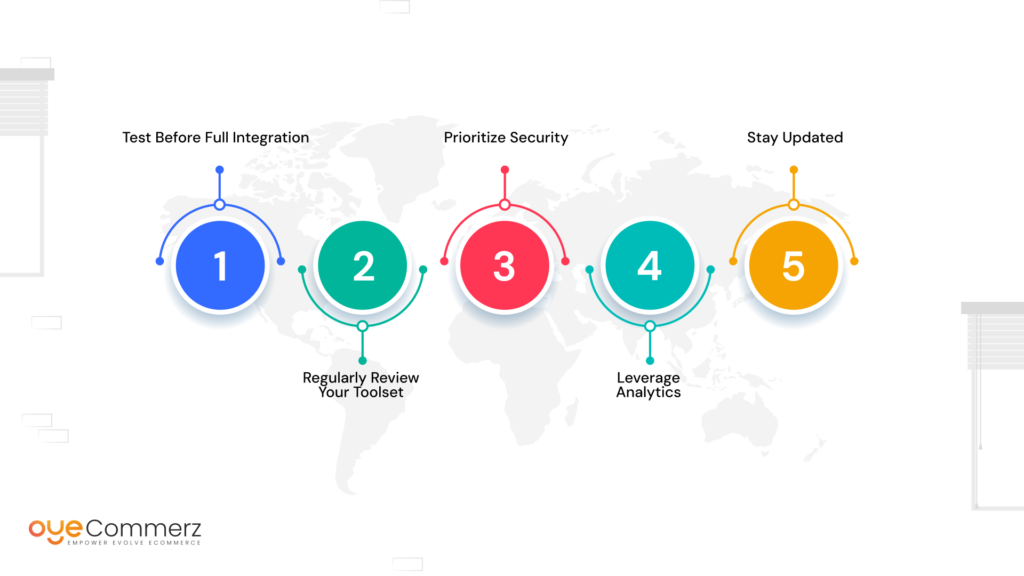
While integrating Shopify tools, follow these best practices to ensure you get maximum value:
Test Before Full Integration
Even what you plan to integrate into your store should be tested first in a real environment to check whether they may affect other tools that your store is using.
Regularly Review Your Toolset
Prospects are quite simple, and as your business grows, you will expand your requirements. Check from time to time if the integration tools that you are using are still fulfilling the intended purpose. It is thus wise to change your current tools with more efficient ones especially those which have become outdated or ineffective.
Prioritize Security
When selecting the tool to be implemented, ensure that it meets the set security standards in order not to affect your store data or that of your customers.
Leverage Analytics
Leverage other marketing tools such as conversion rate, customer lifetime value, Abandoned cart recovery, and other related indicators. All these insights will enhance your operation and maximize your Shopify store.
Stay Updated
Shopify changes its platform features often; this may have an impact on certain tools’ integration. Make sure that the tools that are involved in integration are well-updated to prevent any interruption.
Take Your Next Big Step in E-Commerce with OyeCommerz!
At OyeCommerz, we specialize in integrating the essential tools that drive efficiency, boost sales, and enhance customer experiences. From automating your inventory management to streamlining your marketing efforts, our Shopify integration services are designed to help your business thrive in today’s competitive e-commerce landscape. Contact OyeCommerz today and transform your Shopify store with the must-have integration tools!
Maximize efficiency with professional Shopify integration services
Conclusion
Shopify integration tools are no longer optional; they are essential to running a thriving e-commerce business. From automating marketing efforts to streamlining shipping and accounting, the right tools can significantly impact your store’s efficiency and success. By carefully selecting tools that align with your business goals and following best practices, you can create a seamless, efficient, and highly profitable Shopify store.
By opting for E-commerce integration services and leveraging top integration tools like Klaviyo, Yotpo, ShipStation, QuickBooks, and Gorgias, your e-commerce business can stay ahead of the competition, offer an exceptional customer experience, and scale efficiently as you grow.

